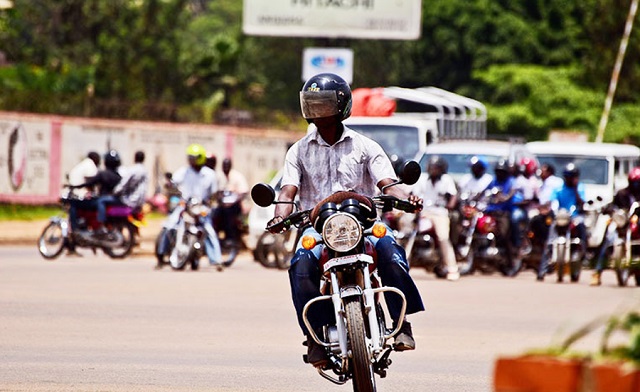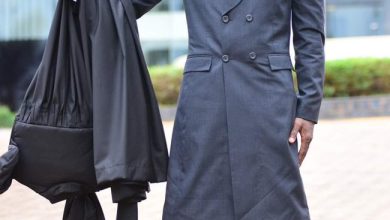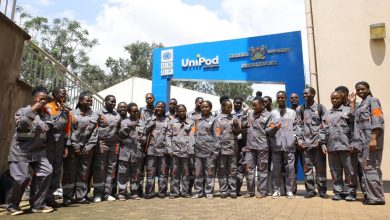
A day in life of a boda boda rider in Kampala
Boda bodas employ a large percentage of youths in Uganda, many of whom operate in Kampala, the capital city.
Some have described the riders as very reckless owing to the way some ride. Others praise them for being efficient and making their journeys easier.
On a chilly Sunday afternoon, we sat down with 25-year-old Sam Kyalema who accepted to speak about his life as a boda boda rider on condition that the writer rides along with him for a certain distance.
The journey was more about spending a day in the life of a boda boda so as to understand what they go through every day as they perform one of the world’s most risky jobs.
The 25-year-old works in the city centre but stays in Nabbingo along the Kampala-Masaka highway, about 15km away from the centre.
He says his day begins at 5.00 am when he wakes up. He leaves his house at 6.00 am to start work.
“I make sure by 6.00 am, I am on the road to take the early birds to the city (Kampala) who don’t want to use taxis. I normally charge each between Shs 3000 and Shs 4000 to the city,” he says.
Kyalema says because around that time traffic jam is starting to build up along the highway, the boda boda is the way out.
He says the money he makes during those wee hours is what he uses for breakfast.
“Because it is still very early, I don’t eat breakfast at home but the money I get from the early morning passengers is what caters for this. I therefore eat breakfast around 8 or 9am when I reach my stage,” he says.
Hits the stage
Kyalema, who works around Mapeera House in the city centre says he is always busy from the time he arrives at his stage up to around 10am.
This is because at this time, many people are moving up and down as they rush to work and to the 25-year-old, this is the best time to get customers.
“Sometimes I skip breakfast because I have taken a customer somewhere or breakfast is brought and I take it two hours later. Nevertheless, whenever I get time, I eat,” he says.
He says that he usually goes for the shorter town service distances that he says are more profitable than the long distances.
“For a distance outside the city, you spend a lot of time but also traffic jam affects you. It means you will use a lot of fuel but also spend more time and earn less. I concentrate on shorter journeys around the city to Kololo, Nakasero, Kamwokya, Mengo, Nateete and Nakawa among other nearby areas.”
He says he usually doesn’t go for luggage, especially one that is heavy and long since it requires one to ride at a slower speed and cautiously so not to damage other people’s vehicles and motorbikes.
The fares
Whereas there are riders using ride hailing applications like Safe Boda, Kyalema says he doesn’t use them.
He therefore charges one according to how they come.
“When a customer comes and tells me where they are going, because I am used to these journeys, I make an offer. I mention the fare. It is up to you the passenger to negotiate to see if I can reduce. However, there is minimum each journey can go for and I can’t go below that,” he says.
Kyalema adds that on many occasions, customers want to pay a fare below what the minimum a journey can go for.
Lunch time
The 25-year-old says on most occasions, between 11am to 3pm, they are not busy and he says he gets time to have lunch.
“Because during this time there are no people moving, we are always seated on the stage chatting and when time for lunch approaches, we enjoy it.”
His stage being a few metres away from Nakasero market, Kyalema says he walks to the market for a “decent but cheap” meal.
“For example, a plate of matooke, rice, posho sweet potatoes and beef goes for only shs4000 yet it is a lot of food and delicious. I would rather go eat from the market than wait at the stage for the people from nearby restaurants to come and get and order from me. These are both expensive but also have tasteless food,” he says.
Kyalema says at around 3pm, “serious” work resumes as people start leaving the city for home.
He says during this time, he doesn’t mainly station at the stage but has to move around the city in search for customers, most of whom are moving to the city centre to book the next bus or taxi back home.
He says he works until 8pm when it is time to return home in Nabbingo.
“While returning home, I make sure I get at least two passengers to go with. I charge each of them shs4000 to make it shs8000 that I use for fuel as I begin the next day,” he says.
Challenges
One of the big challenges, the father of two says, are traffic police officers who impound motorcycles in operations to crackdown on errant riders and those without the necessary requirements.
“When there is an operation on those riding without permits, reflector jackets or helmets, everyone is on tenterhooks. We have to avoid places where we know there are traffic officers or else the motorcycle might end up getting impounded and you pay a fine before getting it back,” he says.
He also mentions the negative attitude that members of the public have about boda boda riders, partly due to their recklessness.
“Some people think we are not humans. They abuse us and speak everything bad about us. It is true some of our colleagues are bad mannered but there are some of us who are not of that caliber.”
Nevertheless, Kyalema says he is proud of his job as a boda boda rider.
“Whereas I dropped out of school in senior four, I don’t regret joining the boda boda business. I bought a piece of land, married a wife and I can ably take care of my two children. This is courtesy of my boda boda,”



